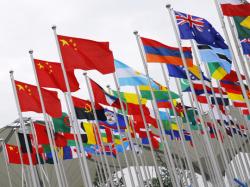IDFA Disappointed That U.S.-Korea Free Trade Agreement Still Not Reached
November 16, 2010 | 2 min to read

WASHINGTON — The International Dairy Foods Association urges continued negotiations between the United States and South Korea to reach agreement on an expansive free-trade agreement with South Korea. President Obama and South Korean President Lee Myung-bak announced earlier this week that, after intense negotiations leading up to the Group of 20 summit, more negotiations were needed before a deal could be reached.
IDFA considers this agreement critical for the U.S. dairy industry to take full advantage of growing markets in a vital economic region. The agreement is expected to provide reduced tariffs and expanded market opportunities in a very restricted and high-value market that received $76 million in U.S. dairy exports in 2009. South Korea is the United States' sixth largest export market for dairy and dairy products.
"It is imperative that the agreement be ratified quickly for its benefits to be fully realized," said Clay Hough, IDFA senior group vice president and general counsel. "The U.S. dairy industry will gain immediate open access for whey for feed uses, as well as tariff-free access for approximately 16,000 metric tons of cheese, milk powders, whey for food uses and other important dairy products."
IDFA strongly encourages quick action to complete negotiations and implement the agreement, and notes that Korea is in the process of finalizing a competing agreement with the European Union.
South Korea is one of Asia's fastest growing economies. Global consumption patterns show that the consumption of animal protein, including dairy, increases as income grows. Per capita consumption of dairy products in South Korea is increasing mainly due to the younger generation and its penchant for Western foods such as pizzas, cheeseburgers and sandwiches.
The continuing growth in fast food and the rapid growth of wine consumption are also expected to increase demand for a variety of high-quality cheeses. According to the U.S. Department of Agriculture, most of this increased demand will be supplied by imports because local production of cheese is constrained by the lack of manufacturing facilities. U.S. dairy exports are positioned to fill a specific consumer demand, which local manufacturers are not able to supply.
Through August 2010, the value of U.S. dairy exports to South Korea was $84 million, up 78 percent from the same time period last year. The U.S. International Trade Commission has estimated that the dairy provisions of the agreement would expand U.S. dairy exports by $175 million to $336 million.
Once agreement is reached between the two nations, Congress will need to ratify the agreement.
The International Dairy Foods Association (IDFA), Washington, D.C., represents the nation's dairy manufacturing and marketing industries and their suppliers, with a membership of 550 companies representing a $110-billion a year industry. IDFA is composed of three constituent organizations: the Milk Industry Foundation (MIF), the National Cheese Institute (NCI) and the International Ice Cream Association (IICA). IDFA's 220 dairy processing members run more than 600 plant operations, and range from large multi-national organizations to single-plant companies. Together they represent more than 85 percent of the milk, cultured products, cheese and frozen desserts produced and marketed in the United States.
Source: International Dairy Foods Association
